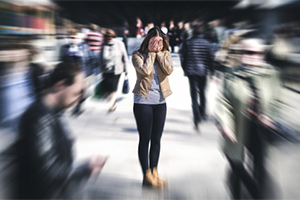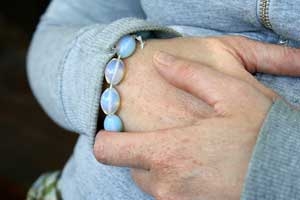What You Need to Know About Panic Attacks and Anxiety
The way you view anxiety conditions has a powerful effect on how they affect you.
 During a panic attack, the brain works differently and we lose the ability to think clearly.
During a panic attack, the brain works differently and we lose the ability to think clearly."People just don't understand how bad it feels!" My client, Rachel, almost wept as she spoke of the horrible anxiety she'd suffered for years, which sometimes boiled over into the "worst panic attacks imaginable".
"People say, 'yeah, I used to have panic attacks too', but they still don't seem to understand how bad it is for me, how I just can't do anything when one comes on!" She miserably described all the usual characteristics of panic:
- Shortness of breath
- Feeling like she might be sick, or empty her stomach contents in "other ways"
- Shaking
- Feeling stuck to the spot but wanting to escape
- Feeling like her thoughts are going too fast or that she can't think at all
- Feeling like she's going to die or go mad or humiliate herself.
Rachel was right. It can be hard to believe that anyone else could possibly know what it's like to experience the searing horror of utter panic when everyone else around seems calm and 'normal'.
Of course, generalized anxiety, a sense of foreboding and the discomfort of tension, are common, and so too are panic attacks.1,2 But when you're the one experiencing it, it can feel really isolating.
I taught Rachel ways to stop panic attacks in their tracks, but there were some important things I really wanted her to know about anxiety and panic, because knowledge is power. And this might be really valuable for you too.
So what do we need to know?
We don't cure anxiety, we align it.
Anxiety isn't an illness or disease in itself. Like, say, appetite, it's only a problem when it becomes uncontrolled and excessive. Although countless people whom I have treated for trauma, panic attacks, and worry now consider themselves cured, the capacity for anxiety needs to always be available to us.
Research has found that anxious people tend to be safer during real emergencies, as they tend to flee the soonest, even before the real emergency gets going.3 Some anxiety, when it's needed, is vital. And sometimes we need to go all the way.
The highest level of anxiety, often called a panic attack, is really a manifestation of the 'fight-or-flight response' - a powerful emergency mechanism that puts your body in the perfect state for tackling an aggressor or getting out of there fast.
So we don't cure anxiety - we align it, and treat it to ensure it becomes not just manageable but controllable. After all, security shouldn't assume it's the manager.
But Rachel told me something else, which might sound familiar: "Sometimes I feel like it's not fight or flight, but like I'm sort of stuck or frozen to the spot!"
Fight, flight... or freeze
Rachel was right. Before we either fight or flee, we freeze. Often this is just for milliseconds, but - and here's the thing - if we feel inescapably trapped, we may find that our energy shuts down and we just stay in freeze mode.
Watch a squirrel on a garden fence. If it becomes aware that you, a possible predator, are observing it, then it may freeze. If you approach, it will come out of this frozen state and scamper off at a sprint. It's gone from freeze to flight (unless it's one of those dastardly killer squirrels that goes into fight!).
We evolved across sweeping savannahs, where big predators detected their prey largely through motion. When a tiger comes your way, freezing may make you harder to spot - which hopefully means it will move on, giving you a chance to vamos fast.
So this freezing before fight or flight is natural, and was once vital for survival purposes. But we humans sometimes freeze when we wrongly feel trapped or helpless. Many depressed people feel stuck, as though they can't act or help themselves even when perhaps they could. This is called learned helplessness.
During high anxiety, if someone feels they can't run or fight - if, say, they are just about to give a speech - they may feel as though all energy has drained from them. They may feel frozen and stuck and unable to think clearly and remember. More of that in a moment.
Rachel told me she felt there was a whole host of physical problems associated with her anxiety. See if you've experienced any of the following.
Sick of feeling sick?
Acute anxiety can make us feel we might vomit or defecate. Why? Well, just maybe because if we did in the wild, we would instantly become a less appetising meal for a predator. Yuck! Rachel had told me she often felt like she needed the bathroom when she was anxious, but this connection to becoming an off-putting meal had, perhaps not surprisingly, never occurred to her.
So if bowel problems or feeling sick has been a feature of any anxiety you've experienced, ask yourself whether you really are likely to be eaten by some large predator.
In fact, all the 'symptoms' of anxiety are, in a short-term emergency, adaptive and valuable. Other changes that occur during anxiety, fear, and panic include:
- Our blood leaves the stomach to pump into the large muscles for action. If we don't use these muscles by sprinting or fighting, the muscles may shake in expectation of exercise.
- We breathe hard and fast. Again, remember that panic is the exercise response kicking in, and if you were running hard it wouldn't feel weird to be breathing hard and fast.
- We sweat. Once again, your body is primed for exercise. The palms may become wet so that when they dry they are better able to grip trees for climbing away from predators.
- Thoughts become all or nothing. Run or flee! Fight or play dead! As emotion rises, clear, nuanced thought shuts down in a kind of 'emotional hijacking'.
- We become hypervigilant and hyperaware - though our focus actually narrows, too - as we are flooded with energy.
- Immune function lowers as all available resources are flooded with cortisol for fight or flight.
- Sex drive switches off, as it's no use feeling horny if a lion is about to eat you. All functions not essential to the emergency at hand become sidelined.
Now, these are changes that occur during panic. But if we see anxiety as being on the same spectrum as panic but just less intense, then we can see that if stress is prolonged over days, weeks, months, or even years then these short-term adaptive responses start to backfire. So generally anxious people may develop stomach problems, or breathe more shallowly than their more relaxed counterparts.
Anxious people may find they think in all-or-nothing ways but don't see the subtle shades of grey in life. Thinking in a fight-or-flight, all-or-nothing, 'absolutist' way is a feature of emotional difficulties like depression.4 In an emergency, simple thoughts consisting of either this or that may save our life, but it's no way to think long term.
Because of her anxiety, Rachel had trouble sleeping. After all, you don't want to sleep when a hungry wolf pack is pursuing you! Even sleeplessness, if you're, say, lost at sea clinging to a life raft, may help you survive.
Long-term stress from anxiety may impair immune function, increasing the potential for physical illnesses, just as relaxation can enhance immunity.5
Long-term anxiety can also wreak havoc on our sex drive, which is, quite rightly, shut down during life-or-death emergencies, but can also be dampened if our bodies feel we are continuously under threat.
Rachel was actually intrigued to understand that her physical symptoms of long-term stress were simply a sign of adaptive changes prolonged for way too long. She said, "Tensing your muscles really tight is great if you're about to lift something heavy, but you don't want your muscles to be that tight for months on end!"
Exactly.
But what of panic? Rachel told me she felt it just "comes from nowhere". But is that true? Sorry, there's a spoiler in the following subheading...
Panic doesn't come from nowhere.
Panic might seem to come like lightning from a clear blue sky, but in reality there's generally a build-up. I'm not talking about the panic you or I might justifiably experience if, say, a bomb went off, but rather the kind that seems to serve absolutely no purpose but to make us miserable.
Researchers found that an hour before someone experiences inappropriate panic, they tend to breathe more shallowly and quickly than someone who doesn't go on to panic.6 The lead researcher, psychologist Alicia E. Meuret of Southern Methodist University in Dallas, found that there are "waves of significant physiological instability for at least 60 minutes before patients' awareness of the panic attacks."
So, and I know this sounds blindingly obvious, in order to lower anxiety and lessen the likelihood of panic we need to relax more. When we do this, it becomes harder to panic, because we've reset our system, as it were, to be less able to feel anxious or panic.
I taught Rachel to rest, really rest, and relax.
Chill out more.
The point is that, unless there is some actual sudden threat, panic doesn't just emerge from a state of deep calm. Panic rises from a higher than normal level of base arousal or anxiety. This heightened level of stress can, through its familiarity, mask the fact that panic has come from somewhere rather than, as Rachel put it, "absolutely nowhere".
If a tripwire is set really high, it becomes much easier to keep tripping over it, especially if we don't notice how high it has become.
So there is usually a physiological build-up to panic, even if the person has no conscious awareness of that build-up... but there is an exception to this.
Panic can be conditioned.
Imagine that I wander into a delicatessen for lunch on a day when my stress levels are through the roof. Suddenly, 'out of nowhere', I panic. Blood pumps into my arms and legs. I breathe like I'm on a treadmill. I feel terrified. What do I do? I run out, and the vendor is left wondering whether I didn't just shoplift some prime halloumi.
I think I've gotten over this weird, horrible experience. But the next time I try to go there I'm flipped into this baffling panic again!
Why?
My unconscious brain, in a misguided bid to help me survive, will make it hard to go back into that store again - or even anything that resembles that store - because it has tagged it as dangerous, even though logically I know it isn't.
It's as though this kind of unconscious learning is trying to help me out by concluding, "Well, if you panicked that much in this kind of place before, then it must be life threatening. Therefore, I'll help keep you safe by increasing fear around that situation or ones like it in future." This kind of learning is called pattern matching, and you can hear my colleague Roger Elliott talk about it here.
So sometimes panic can come quickly if this kind of unconscious association has been instilled in the mind. The trigger can flip us back into the same state as before.
It's as though the brain, in a bid to err on the side of caution, tries to keep you safe by generalizing. One man I treated who had been badly assaulted by a man with a beard found he would panic if he saw any men with beards! Rachel had once panicked on a train, and now felt anxious and panicky whenever she tried to get back on one. Her mind was actually trying to help her out, as weird as that seems.
Fortunately, this kind of accidental, unconscious learning can be treated using techniques like mindfulness and therapeutic hypnosis.
So:
- We align anxiety rather than get rid of it altogether. We evolved to panic and feel fear, and these states are not 'diseases' - but we only need to have them when they are actually useful.
- Freeze always happens before fight or flight, but sometimes we simply stay in freeze.
- The physical symptoms of long-term stress are really adaptive responses to panic that have hung around way too long.
- Most panic attacks don't just come from nowhere, even though they might seem to.
- Panic and anxiety are easily conditioned below the conscious level. But we can start to train and master these responses with techniques that work on the same level as this unconscious conditioning, such as therapeutic hypnosis, mindfulness, and other therapies that use relaxation as an antidote to stress.
Rachel quickly learned to switch off panic when it wasn't needed (which was nearly all the time!). She started to relax more, and because of that felt physically as well as mentally healthier. Her sleep improved too.
But best of all, she said, "I now feel in control of my life!"
You can find our anxiety and panic hypnosis sessions here.

Get a free hypnosis session with our new Overcome Anxiety app for iPhone & Android
Includes our most popular anxiety treatment session free, with the option to upgrade to 10 more sessions.
Get the Overcome Anxiety Hypnosis app for iOS (iPhone or iPad) here or for Android here.
References
- https://onlinelibrary.wiley.com/doi/abs/10.1002/da.10065
- https://www.webmd.com/anxiety-panic/qa/how-common-is-panic-disorder
- https://www.nature.com/articles/s41562-019-0595-5
- https://journals.sagepub.com/doi/full/10.1177/2167702617747074
- https://www.apa.org/research/action/immune
- https://www.sciencedaily.com/releases/2011/07/110727122651.htm








